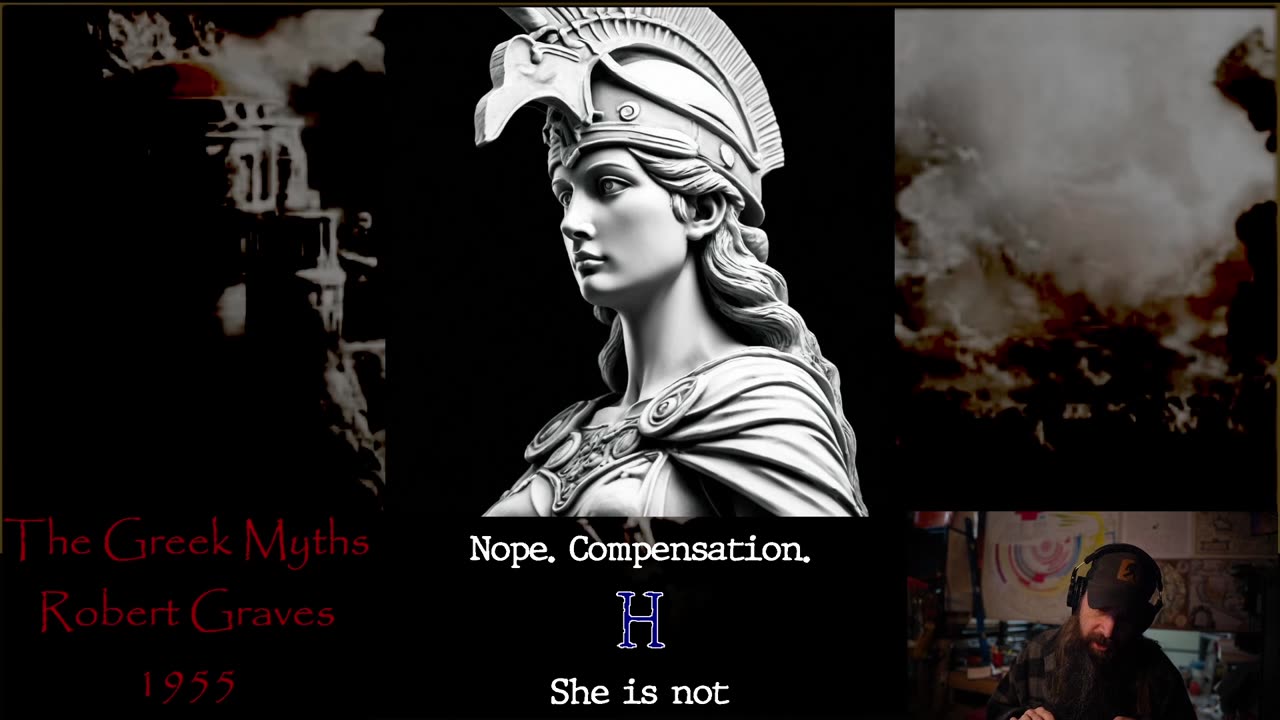Premium Only Content

The Greek Myths - B1 - 25
The Greek Myths - B1 - 25
This video explores the Greek myths surrounding the goddess Athena, detailing her inventions, her role in battles, and her interactions with other gods. It discusses her wisdom in warfare, her creation of various societal norms, and the stories of her offspring, including Ericthonius. The narrative also highlights Athena's relationships with other gods, her acts of mercy, and the cultural significance attributed to her in ancient Athens.
Key Points:
Athena's Inventions
Athena is credited with numerous inventions including the flute, trumpet, plow, and various arts like cooking and weaving. She is celebrated for her contributions to civilization while remaining a goddess of war who prefers peace and justice.
Role in Battles
Although a goddess of war, Athena takes no pleasure in combat like Ares. Instead, she is known for her strategic mind, often being sought for military advice and ensuring victory in battles.
The Birth of Ericthonius
Amidst a series of events where Athena faced unwanted advances, she took charge of Ericthonius, a child born from her interaction with a smith, and raised him secretly to preserve his lineage.
Cultural Influence of Athena
Athena's impact on Athenian culture is immense, with her image connected to monogamy and the worship practices that shaped societal norms in ancient Greece.
The Myth of Arachne
Athena's jealousy led to her transforming a skilled weaver named Arachne into a spider after Arachne claimed superiority in weaving, a tale reflecting competition among goddess and mortals.
Significance of Crow in Myths
The crow's transformation from white to black symbolizes Athena’s banishment of the creature, illustrating themes of rivalry and punishment related to commercial interests and alliances.
Ericthonius in Athens
Ericthonius, raised by Athena, grows to become a significant king of Athens, associated with the founding of cultural practices and the introduction of agricultural innovations.
Household Shrines
The distinction between domestic shrines and temples reflects the worship practices in ancient Greece, indicating how the sacred king Ericthonius shared space with Athena in their respective domains.
-
 1:31:45
1:31:45
Chicks On The Right
4 hours agoCharlie's Memorial: highlights, the lead-up, the crowds, and the speech that broke the internet.
18.4K6 -
 LIVE
LIVE
LFA TV
13 hours agoLFA TV ALL DAY STREAM ! | MONDAY 9/22/25
3,551 watching -
 1:09:12
1:09:12
JULIE GREEN MINISTRIES
3 hours agoLIVE WITH JULIE
80.7K156 -
 4:01:24
4:01:24
The Bubba Army
3 days ago90K Honor Charlie Kirk At Memorial - Bubba the Love Sponge® Show | 9/22/25
49.3K14 -
 38:21
38:21
Stephen Gardner
2 days ago🔥Is Kash Patel HIDING DETAILS About Charlie Kirk & Jeffrey Epstein? Judge Joe Brown
89.4K208 -
 26:33
26:33
DeVory Darkins
1 day ago $62.52 earnedRep Omar EMBARRASSES herself in a painful way as Newsom PANICS over Kamala confrontation
120K347 -
 3:28:14
3:28:14
Badlands Media
1 day agoThe Narrative Ep. 39: The Sovereign Mind
147K44 -
 2:17:35
2:17:35
TheSaltyCracker
14 hours agoThe Charlie Kirk Effect ReeEEStream 9-21-25
166K421 -
 2:03:07
2:03:07
vivafrei
14 hours agoEp. 283: Charlie Kirk Memorial and other Stuff in the Law World
261K243 -
 9:13:12
9:13:12
The Charlie Kirk Show
1 day agoLIVE NOW: Building A Legacy, Remembering Charlie Kirk
2.23M1K